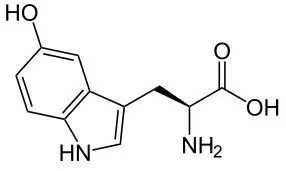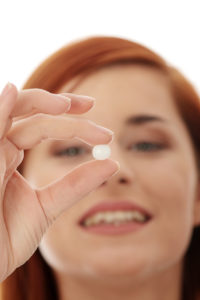Table of Contents
5-HTP (5-Hydroxytryptophan or oxitriptan) is an amino acid that is naturally produced in your body. 5-HTP is synthesized from the amino acid tryptophan which we get from food.
5-HTP is the immediate precursor of serotonin. And as a nootropic and dietary supplement, 5-HTP is popular with those who advocate its effectiveness in treating depression. Along with a number of other serotonin-related diseases.
But using 5-HTP for treating depression and anxiety is not supported by science. The research is contrary to how 5-HTP is viewed by many, including medical doctors.
When we dig into the research, we find that 5-HTP may be contraindicated for depression in those whom marketers advocate its use.[i]
We’re all for boosting neurotransmitter levels and optimizing cognitive performance here at Nootropics Expert®. But now and again I run into a nootropic or dietary supplement that may be popular. But also may be a particularly bad idea.
We’re going to get to the bottom of how 5-HTP works in your brain in this review. We’ll examine why it’s critical for brain health. And reasons why you may want to find another way to boost serotonin levels in your brain.
5-HTP helps:
- Anxiety & Depression. 5-HTP is synthesized into serotonin in brain cells. Elevating levels of serotonin can help relieve the symptoms of anxiety and depression.
- Neurotransmitters. 5-HTP is a necessary ingredient for serotonin synthesis which boosts mood and social behavior, improves memory, regulates appetite and digestion, sleep, sexual desire and function.
- Brain Optimization. A critical balance of the primary neurotransmitters serotonin and dopamine are needed for the highly optimized brain. When these neurotransmitters are not in balance it affects mood, memory, cognition, decision-making, sexual desire, and a host of other critical life functions.
What is 5-HTP?
5-HTP (5-Hydroxytryptophan or oxitriptan) is an amino acid that’s synthesized from the essential amino acid tryptophan.

Tryptophan is hydroxylated by tryptophan hydroxylase to 5-HTP (5-hydroxytryptophan), then decarboxylated to serotonin (5-hydroxytryptamine or 5-HT).[ii]
Tryptophan → 5-HTP → serotonin
80-90% of your body’s serotonin is made in your intestines. But serotonin cannot cross the blood-brain barrier. So all the serotonin that your brain needs has to be made within the brain. This is where 5-HTP comes in…
5-HTP crosses the blood-brain barrier more readily than tryptophan. And gets synthesized into serotonin at a faster rate than from tryptophan.[iii]
As a neurotransmitter, serotonin influences directly and indirectly, the majority of brain cells. So if you want to boost serotonin in your brain, some find that supplementing with 5-HTP is better than taking tryptophan.
Tryptophan, which your body uses to make 5-HTP, can be found in turkey, chicken, milk, potatoes, pumpkin, sunflower seeds, turnip and collard greens, and seaweed.
5-HTP as a nootropic supplement is a naturally occurring amino acid derived from seed pods of Griffonia simplicifolia, found in West and Central Africa. 5-HTP content in extracts of this plant vary from 2 – 20.83% (from seeds obtained in Ghana).[iv]
How does 5-HTP work in the Brain?
5-HTP is a precursor to serotonin. The neurotransmitter serotonin plays a role in sleep, appetite, learning & memory, mood, and sexual function.
When tryptophan’s role in converting to 5-HTP for boosting serotonin doesn’t work efficiently, the result is often depression, chronic headache and insomnia.
An open-label trial was conducted in Italy to determine the efficacy of using 5-HTP in young subjects with high levels of “romantic stress”.
Serotonin has been linked to human romantic attachment. So researchers in this study set out to determine brain levels of Brain-Derived Neurotrophic Factor (BDNF) and serotonin in relation to changes in romantic stress during the study.
15 healthy subjects (mean age 23.3 years) who had a “romantic breakup” took part in the study. Participants received 60 mg of Griffonia simplicifolia extract containing 12.8 mg 5-HTP daily for 6 weeks.
The subjects were evaluated for BDNF and serotonin levels at the beginning of the study, at 3 weeks and then again at the end of the 6-week trial.
The scientists observed significant improvements in romantic stress scores from weeks 0 through 3. So far, 5-HTP seems to be working. But no further improvement was seen from weeks 3 through 6. Even though the young people had significantly higher levels of BDNF and serotonin.[v]
More Involved in Depression and Stress than Serotonin
This “romantic breakup” study is a classic illustration of why using 5-HTP alone to treat depression and stress may not work. And if it does work, why it may not work for long.
Depression is often more than simple serotonin dysfunction. Depression can also be associated with catecholamine dysfunction, including dopamine and/or norepinephrine. Or a combination of serotonin and catecholamine dysfunction.
When you take 5-HTP alone, you are also depleting dopamine, norepinephrine, and epinephrine. Synthesis of serotonin from 5-HTP, and dopamine from L-DOPA is catalyzed by the same enzyme, L-aromatic amino acid decarboxylase (AAAD).
Dopamine and serotonin precursor supplementation must be taken in proper balance. Because when you use only 5-HTP, it dominates dopamine at the AAAD enzyme synthesis level.
Blocking dopamine synthesis at the AAAD enzyme through competitive inhibition will lead to depletion of dopamine and the rest of the catecholamines.[vi]
Going back to our Italian study of young people dealing with “romantic stress”, the subjects stopped responding to 5-HTP in the 2nd half of the study. Likely because their catecholamines became depleted through continuous 5-HTP supplementation.
Studies have found that when dopamine is depleted enough, 5-HTP will no longer function.[vii]
Catecholamine Dysfunction Affects More Than Just Depression
When catecholamine neurotransmitter levels (dopamine and/or norepinephrine) influence depression, supplementing with 5-HTP alone is not the way to go. Because you may deplete dopamine and norepinephrine, worsening the disease and its underlying cause.
But this contraindication is not exclusive to depression. It extends to all other diseases where catecholamine dysfunction has been implicated. Including ADHD[viii], obesity, anxiety, seasonal affective disorder (SAD), and Parkinson’s Disease.[ix]
How things go bad
 Amino acid precursors of serotonin (i.e. 5-HTP) and dopamine (i.e. L-Tyrosine) work together during synthesis, metabolism and transport to the point that they function as one system.
Amino acid precursors of serotonin (i.e. 5-HTP) and dopamine (i.e. L-Tyrosine) work together during synthesis, metabolism and transport to the point that they function as one system.
When serotonin and dopamine are properly balanced, functions that are regulated only by serotonin, can be regulated by manipulating dopamine levels. And functions regulated only by dopamine in this balanced state can be regulated by manipulating serotonin.[x]
When you mess with this balance and improperly supplement with serotonin or dopamine precursors, you don’t get the desired effect of using that nootropic. And you increase the possibility of side effects with too much serotonin.
If you supplement with only one precursor (i.e. 5-HTP to boost serotonin) that dominates the other system (i.e. dopamine synthesis), depletion of the dominated system will occur (i.e. depleted dopamine).
And if this effect is pronounced enough, you will not get the benefit you were aiming for when supplementing with the original precursor (i.e. 5-HTP).
A powerful example of this effect is in the management of Parkinson’s Disease where the effects of L-DOPA are no longer observed over time due to serotonin depletion.[xi]
Since serotonin and dopamine cannot cross the blood-brain barrier, the number of serotonin and dopamine molecules in the brain is a function of the amount of nutrients (amino acid precursors) that are available to be synthesized into new neurotransmitter molecules.
Optimizing brain function with minimal side effects is NOT a function of supplementing until you get sufficiently high amino acid levels. It’s a function of achieving the proper balance between serotonin and dopamine.
5-HTP benefits
5-HTP is absolutely critical for synthesis of serotonin in your brain. But supplementing with 5-HTP to boost serotonin does not work well.
Using 5-HTP to treat depression has had very little success over the last few decades of clinical trials and biohacking.
Integrating 5-HTP into your nootropic stack is much more complicated than simply adding some 5-HTP in order to boost serotonin.
5-HTP alone will not work for depression, or any other issue you’re dealing with involving the catecholamines (dopamine, norepinephrine, epinephrine) because of 5-HTP’s tendency to deplete those neurotransmitters.
5-HTP will boost serotonin in your brain.[xii] But 5-HTP must be carefully stacked with precursors for dopamine and norepinephrine or you risk making the situation worse.
You must avoid supplementing with only one of the serotonin or dopamine amino acid precursors. When amino acid precursors are not in balance, you end up with decreased effectiveness of that nootropic, increased side effects, and depletion of the non-dominant system.
How does 5-HTP feel?
Reactions to supplementing with 5-HTP vary considerably but the one consistent theme is initial feelings of well-being, better sleep, less need for sleep, improved mood, less social anxiety, lower appetite, improved tolerance for stress and improved cognitive function.
And after a couple of weeks of dosing 5-HTP – side effects begin. Serotonin overload results in dopamine and norepinephrine depletion.
Side effects include feelings of lethargy, depression, brain fog, stomach pain, and possibly a chronic tension type of headache. Worst case scenario is nausea, vomiting and even blacking out.
Neurohackers who report consistent success supplementing with 5-HTP stack it with B-Vitamins, a dopamine precursor like L-Tyrosine, and only use 5-HTP as needed.
Those who have a bad experience with 5-HTP from the start often have no idea why they’ve reacted badly. But an educated guess is their depression was catecholamine (dopamine, norepinephrine, epinephrine)-related. And boosting serotonin made their dopamine-related issues worse. Very quickly.
One huge word of WARNING: Do NOT take 5-HTP with any antidepressant medication. You put yourself in the very real danger of Serotonin Syndrome which can ultimately kill you.
5-HTP Clinical Research
5-HTP supplements are heavily marketed as a natural remedy for depression. But the science does not support using 5-HTP for depression. We have decades of clinical trials available. And there is no evidence of the efficacy in using 5-HTP for depression.
5-HTP instead of selective serotonin reuptake inhibitors
The Department of Public Health at the University of Queensland Medical School in Australia did a systematic review of literature dating from 1966 – 2000 for “5-HTP” and “depression”.
The researchers found 108 clinical studies of which only 2 studies, one with serotonin (5-HT) and one with L-Tryptophan for a total of 64 patients met sufficient quality criteria to be included. These studies suggest serotonin (5-HT) and L-Tryptophan are better than placebo at alleviating depression.
But the researchers noted “the small size of the studies, and the large number of inadmissible, poorly executed studies, cast doubt on the results from potential publication bias, and suggests that they are insufficiently evaluated to assess their effectiveness.”[xiii]
5-HTP for Fibromyalgia
A double blind controlled study in Italy studied the efficacy of using 5-HTP in treating fibromyalgia symptoms.
50 patients with primary fibromyalgia syndrome were selected for this study. This 1990 study did not publish the amount of 5-HTP used. But the researchers found a significant improvement in fibromyalgia symptoms with only mild and transient side effects.[xiv]
5-HTP for Treatment of Depression
Insufficient activity of the neurotransmitters serotonin and norepinephrine is a central element of the model of depression most widely held by neurobiologists today.
In the late 1970’s and 1980’s, numerous studies were performed in which depressed patients were treated with the serotonin precursors L-Tryptophan and 5-Hydroxytryptophan (5-HTP), and the dopamine and norepinephrine precursors Tyrosine and L-Phenylalanine.
A summary published in the Alternative Medicine Revue looked at the data from all these studies. The author noted that the nature of the studies makes it difficult to draw firm conclusions regarding the efficacy of neurotransmitter precursors for treating depression.
While there is evidence that precursor loading could work, particularly for serotonin precursor 5-HTP, more studies of suitable design and size “might lead to more conclusive results”.[xv]
Those studies have not materialized since that report was published 22 years ago.
5-HTP Recommended Dosage
Recommended dosage of 5-HTP if you’re going to try it is 50 mg 1 – 3 times per day.
Some studies have used higher doses than the recommended dose, but 5-HTP can be toxic for your central nervous system at high doses.
For anxiety or depression, 5-HTP is dosed at 150 – 300 mg per day total.
To relieve post MDMA (Ecstasy) depression, 5-HTP 100 mg on Day 3-7 after MDMA use.[xvi]
Successfully supplementing with 5-HTP requires stacking it with a dopamine precursor like L-Tyrosine or L-DOPA along with B-Vitamins (for synthesis), and one of the sulfur-containing amino acids (methionine, cysteine, homocysteine, or taurine).
And you must monitor the effects this stack is having on your body. If you start experiencing side effects of any kind, it’s a good indication that either serotonin or dopamine is out of balance.
DO NOT combine 5-HTP with any kind of antidepressant medication.
Combining SSRI’s, Tricyclics or MAOI’s with 5-HTP will cause Serotonin Syndrome. An extremely dangerous condition involving severe mental changes, hot flashes, rapidly fluctuating blood pressure and heart rate, and possibly coma leading to death.
Serotonin Syndrome can kill you. And I’m not kidding here.
5-HTP Side Effects
5-HTP supplementation can cause heartburn, heart palpitations, headache, stomach pain, nausea, vomiting, diarrhea, drowsiness, sexual problems and muscle issues.
5-HTP can also cause some pretty radical mood changes including agitation, aggressiveness, anxiety, euphoria, poor decision-making, irritability, psychosis, restlessness and insomnia.
5-HTP can make the symptoms of schizophrenia, bipolar disorder and other mental disorders worse.
Serotonin Syndrome
And I can’t emphasize this enough so I’m going to repeat it here in case you missed it…
DO NOT combine 5-HTP with any kind of antidepressant medication. Or with carbidopa.
Combining SSRI’s, Tricyclics or MAOI’s with 5-HTP will cause Serotonin Syndrome. An extremely dangerous condition involving severe mental changes, hot flashes, rapidly fluctuating blood pressure and heart rate, and possibly coma.
And combining 5-HTP with carbidopa also has the potential of causing Serotonin Syndrome.
Serotonin Syndrome can kill you. And I’m not kidding here.
Type of 5-HTP to Buy
5-HTP is made from tryptophan in your body.
5-HTP as a nootropic supplement is made from extracts of the African tree Griffonia simplicifolia. 5-HTP supplements are typically in tablet or capsule form.
You’ll often find 5-HTP in many ready-made vitamin and herbal formulas.
Nootropics Expert Recommendation
5-HTP 50 mg up to 3-times per day
 I DO NOT recommend using 5-HTP as a nootropic supplement.
I DO NOT recommend using 5-HTP as a nootropic supplement.
Your body does synthesize 5-HTP on its own to make serotonin in your brain. And you can’t get 5-HTP from food. But you can get L-Tryptophan from food which is synthesized into 5-HTP in your body.
5-HTP may help you if you’re dealing with depression. But you must stack if with a dopamine amino acid precursor along with B-Vitamins and a sulfur-containing amino acid. See the “5-HTP Recommended Dosage” in this review above.
IF you are going to try 5-HTP, I suggest starting with a dose of more than 50 mg daily. You may want to take it in the evening because it could help sleep disorders.
Short-term dosing of 5-HTP of no more than 2 weeks seems to provide the most benefit if you’re going to benefit from this nootropic.
Or try using 5-HTP only on an “as needed” basis. For a mood boost, reduce social anxiety, and provide a short-term boost in cognition.
5-HTP supplementation on its own is NOT recommended. Nor is it recommended for long-term use.











Join The Discussion - 365 comments
Sandi Amiradaki
November 2, 2021
Hi David, I feel so blessed to have found your website and this awesome book as I have been looking for information on the proper use of nootropics for a long time. My hubby has Parkinson’s and uses Levidopa daily. He uses Vit B (without B2) Neurobian, Co Q10 and Inositol 500mg daily, zink, and Vit D3. Can I add 5HTP, Gaba or L Phenylalanine to enhance brain function and help with motivation?
And sorry, I’m in the picture as well. (I actually meant to ask about me, but then realized he may need it more) I am 60 and not on HRT. I am now really struggling with anxiety and depression and have no motivation due to my super overwhelmed brain. I work one line every day all day and find I am not coping due to overwhelm. I also suffer from Fibromyalgia and have been taking L theanine and Tramacet but it no longer helps, and I do not want to become a pill popping junky.
Can I take Gabba and 5HTP to help with pain and borderline depression? And do you ship to South Africa?
I’m so sorry about this loooong message but am so desperate!!!
thanks for your EXCELLENT work!!
Regards Sandi
David Tomen
November 3, 2021
Sandy, motivation is dependent on activation of AMPA receptors which go on to activate the dopamine/reward/motivation pathway. More in this article: https://nootropicsexpert.com/hacking-motivation-with-nootropics/. You need L-Tyrosine along with Vitamins B6, B9 & B12 to make dopamine. And Rhodiola Rosea or Resveratrol to activate AMPA receptors.
5-HTP is a direct precursor to making serotonin which goes no to make melatonin so will help with sleep. But not with motivation. GABA helps make GABA and will help calm you and help you sleep but not with motivation. And L-Tyrosine is a far better option for increasing dopamine than Phenylalanine which only last for a few minutes at most.
Do a search of this website (top right) and search for the keyword “fibromyalgia” and see what turns up. It has been my experience that low thyroid hormone T-3 results in fibromyalgia and the only way to eliminate it is to take care of your thyroid hormones.
And I do not ship anywhere. It is the companies that I am affiliated with that you need to check with depending on the supplements you are ordering. If it is individual supplements I usually refer people to stores on Amazon.
Laura
October 31, 2021
Hi David,
I plan to start 5-HTP at 150mg 3 x daily. I also plan to combine this with l-tyrosine, taurine, and a vitamin B complex. Could you advise on the sort of dosage of l-tyrosine and taurine I should start out trying?
Thanks
Laura
David Tomen
October 31, 2021
Laura, L-Tyrosine 500 mg 3-times per day, and Taurine 500 mg twice per day.
Finola
October 20, 2021
Hi David, thank you so much for this very informative article and website!
I’m sorry to be yet another person asking questions on here, but I’d be so grateful for your help…. as I’m really struggling atm with depression, perimenopausal hot flushes and mood changes, anxiety and some ADD symptoms (the latter undiagnosed). Unfortunately I can’t afford a proper consultation with you atm but would love to have one in the future!
I’ve felt benefits in the past from taking 2x50mg a day of 5htp so have been thinking of trying them again but am now looking to follow your suggestion of stacking with B vits, a dopamine precursor and a sulfur-containing amino acid such as NAC.
I do feel low dopamine is probably an issue for me (never realised that before until reading this site, when a light turned on, so thank you for that too!)
Are L-Tyrosine or L-DOPA equally as good – or would you recommend one over the other? At what sort of dose should I start with one of those?
I take it just any old B complex would be OK, or does one need to buy the best quality possible?
I also sometimes microdose with something that’s a GABA agonist.. Do you see any potential risks/contraindications with that, in amid the stack?
Many thanks!
David Tomen
October 27, 2021
Finola, L-Tyrosine is a far safer and easier to use supplement than L-DOPA. L-Tyrosine adult dosage is 500 mg twice per day.
This is the B-Complex you should be using: https://amzn.to/3nz0z4O
You should not have a problem with contraindications from the supplements you mentioned above.
Nigel
October 9, 2021
Hi David
I came across your article earlier this year (March?). It is one of the best I have read! I am so glad that I did. Your advice and knowledge have helped me considerably. I wanted to thank you for this.
I have had depression for years. It comes and goes but is always there. I have taken AD’s years ago which helped me at the time. When the depression came back again I didn’t want to have AD’s, so looked at other alternatives.
One of my main problems I find with depression is the lack of sleep or should I say quality of sleep. I started taking 5-HTP to see if this would help. Not that sure it had any effect, but if I took it just before bedtime I had very strange dreams, so I took it earlier in the evening. I stopped taking shortly after this.
For reasons unknown I started taking 5-HTP again sometime late 2020. My partner also took it with me but it didn’t seem to have any effect on her. I can’t say for sure but after several months of taking it my depression was worsening. I don’t blame my depression solely on 5-HTP, the stress of Covid 19 took it’s toll a lot more than I realised.
Then by chance I came across your article. I stopped taking 5-HTP and went onto taking L-Tyrosine (500mg x 2/day) and L-Tryptophan (500mg x 1/day). Almost straight away I noticed a difference! I cannot say for sure whether it was just stopping with the 5-HTP or starting with the L-Tyrosine and L-Tryptophan but I noticed a difference!
I have been taking L-Tyrosine and L-Tryptophan ever since. I miss the odd day now and again but generally have it every day. I really do think it has helped me a lot.
What has also helped me greatly is Cognitive Behavioural Therapy. This has had a huge impact on the way I think. I would advise anyone with mental health issues to at least try CBT. I have also started practicing Mindfulness which has made another big difference to the way I feel. Changing the way I look at things has helped me out more than I can say. It has also taken a lot of pressure and stress I was putting on myself without realising. CBT and Mindfulness go hand in hand.
I will carry on with L-Tyrosine and L-Tryptophan for as long as I feel necessary. Is there a time limit on how long people can take them?
I bought a good set of weighing scales so that I can measure the dosses accurately. They weren’t that expensive, £15, I think. I also bought the L-Tyrosine and L-Tryptophan from the same supplier (big rainforest in Brazil) for convenience. Sure there are other places to get it. I got 250g of each and I have plenty left.
Once again I would just like to thank you. I digitally offer my hand across the web to shake yours.
It’s really good that you put this information out there and are kind enough to give honest advice to people who need it.
Take care David and keep up the good work.
All the best.
Nige, UK
David Tomen
October 11, 2021
Nigel, when you were using 5-HTP and found your depression got worse it’s because increasing serotonin in excess depresses dopamine. As soon as you started taking L-Tyrosine to increase dopamine you started to feel better.
This is a classic example of why 5-HTP along for depression does not work. Or if it does, it only works for a short period of time.
Dopamine and serotonin work together and must be in balance. You figured this out by trial and error and I congratulate you because this is the key to success with nootropics. Well done sir!
Louise
October 7, 2021
Hi.
I have ADHD. I want to try TYROSINE with 5HTP but i dont understand what dose I need of either and when to take them. My daughter wjo is 16 also had ADHD and about to start her exams this year. She does not get along with ritalin and it gives her heavy headaches. I want to try a more natural method for us both. My daughter struggles with motivation and depression with her struggles to study in school. Please could you advise us on what you feel would be best. thank you so much for your website. 🙂
David Tomen
October 8, 2021
Louise, this article explains what you need for ADHD with or without stimulants. Either way it’ll work. https://nootropicsexpert.com/best-nootropics-for-adhd-add/. You may need to adjust the doses for each supplement to suit you and your daughter.
But instead of using 5-HTP for serotonin I suggest using L-Tryptophan instead. It is safer and easier to dose and will work long-term.
Jenny
October 5, 2021
Hi David,
I really liked your article and found it really helpful. I would really appreciate your feedback and thoughts about the following –
Right now I’m very depressed and am planning on taking a combination of 50 mg of 5HTP in the night with vitamin B6 and EGCG. After I boost up my serotonin, I plan on switching to L-Tryptophan for long-term use. Also, I ordered L-tyrosine which I plan to take 250 mg 2 times during the day.
You mentioned in the article that if I plan on using this combination, it is important to take one of the sulfur containing amino acids. Can you be more specific on what to take and when to take it given my current stack combination?
Thanks in advance for all your help!
David Tomen
October 6, 2021
Jenny, I suggest either Taurine, or N-Acetyl L-Cysteine (NAC) or you can use both. See my reviews for each here on Nootropics Expert.
Tina
October 3, 2021
Can i take tyosine 500gm before breakfast and choline300gm with piracetam 800gm after. At night i used 5htp either 100-200gm
David Tomen
October 4, 2021
Tina, that timing works.
Mercy Long
July 8, 2021
I just took a 100 mg of 5-htp and then came across your video. I don’t take any anti depressants or nalt, anything like that but I do take plant based supplements. I do not take any pharmaceuticals. Will I be safe with this 1 dose. I’m emptying the bottle into the garbage. I hope I haven’t hurt myself with this 1 dose. Thank you for all your excellent videos. I should have looked for this before wasting my money.
David Tomen
July 9, 2021
Mercy, you certainly are not “hurting” yourself by using 5-HTP. It is perfectly natural and your body makes 5-HTP from tryptophan you get from your diet.
The problem when using it as a supplement comes from people expecting it to “cure” their depression. And either it does not work because low serotonin is not your problem. Or it just stops working after 4 – 5 weeks.
A much safer way to increase serotonin is with L-Tryptophan. You can use it long-term at recommended dosages and it will continue to provide benefits for as long as you use it.
But keep in mind that dopamine and serotonin must be in balance. You may need to use L-Tyrosine to increase dopamine to maintain this balance.